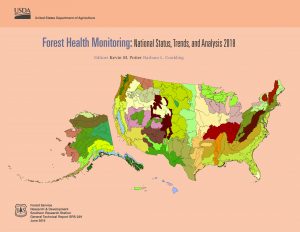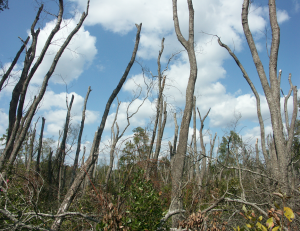
Scientists from across the Forest Service, as well as university researchers, state partners, and other experts contributed to the 2018 FHM report.
Forests are complex ecosystems. They are constantly changing as a result of tree growth, variations in weather and climate, and disturbances from fire, pathogens, and other stressors.
The USDA Forest Service Forest Health Monitoring (FHM) program tracks these ongoing changes — every year, across the nation — as a forest health check up.
The 2018 FHM report is the only national summary of forest health undertaken on an annual basis. It contains short- and long-term forest health assessments for the continental U.S., Alaska, Hawaii, Puerto Rico, and the U.S. Virgin Islands.
The report is available as a General Technical Report. Individual chapters can be downloaded, and the full series of FHM annual reports is also available. Users can search reports and chapters by year or topic. Highlights and additional resources are also included.
Kevin Potter, a North Carolina State University scientist supported by the Southern Research Station, edited the 2018 report with fellow NCSU scientist Barbara Conkling.
The report identifies ecological resources whose condition is deteriorating, potentially in subtle ways, across large regions. This requires consistent, broad-scale, and long-term monitoring of forest health indicators — and the participation of multiple federal, state, academic, and private partners.
“The U.S. is big, and its forests are quite different in different parts of the country,” says Potter. “So, the threats that forests face also vary from place to place. Most of our forests face at least one threat, whether that’s fire or an invasive insect pest or competition from nonnative plants.”
“The FHM reports represent a solid partnership between universities, Forest Service Research, and State and Private Forestry,” notes Tom Eager, FHM national program manager.
Frank Koch, who represents Forest Service Research on the FHM Management Team, adds that the reports are important, “because they provide a way to present research results in a timely and client-oriented way.”
Potter, Conkling, and the other authors have completed a draft of the 2019 FHM report and expect its publication in the summer of 2020.
Read the full text of the report.
For more information, see this blog posting from the U.S. Forest Service Southern Research Station.
December 8, 2019




